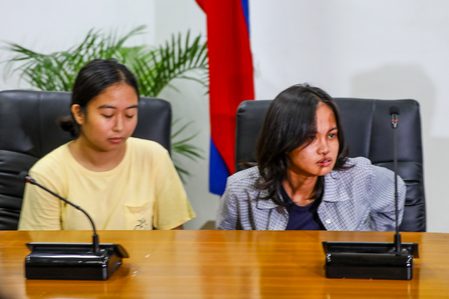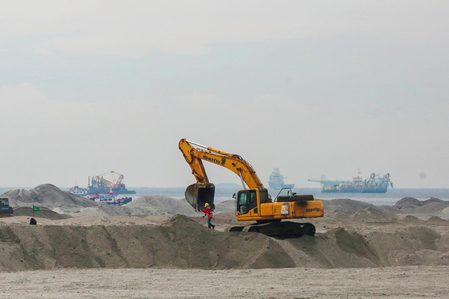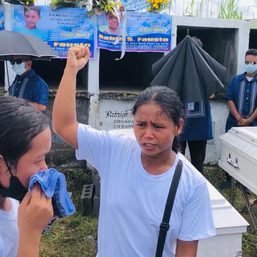SUMMARY
This is AI generated summarization, which may have errors. For context, always refer to the full article.
![[OPINION] In the Philippines, the fight for the climate is a fight against state violence](https://www.rappler.com/tachyon/2024/02/imho-contexualizing-state-violence.jpg)
On September 2 last year, the Filipino environmental activists Jhed Tamano and Jonila Castro disappeared. Castro and Tamano had been working with communities in Manila Bay whose homes and livelihoods were threatened by reclamation projects, including the ongoing construction of the New Manila International Airport.
Three days after their disappearance, their mothers and a group of civil society and church representatives met with police to file a report, but were instead told by officers that the activists were connected to the New People’s Army (NPA), the armed wing of a communist insurgency ongoing in the Philippines since the 1960s.
A few weeks later, the National Security Council announced that Castro and Tamano had sought help from authorities to exit the communist underground and were being held in a safe house for their protection. Human rights organizations, however, were suspicious – in the Philippines, one of the most dangerous countries in the world for environmental defenders, activists like Castro and Tamano are far more likely to be killed by state forces than by communist fighters. The state often justifies these extrajudicial murders by “red-tagging” victims, associating them with the underground Left to justify their deaths.
On September 19, the truth surfaced at a press conference convened by the National Task Force to End Local Communist Armed Conflict, a body set up by former President Rodrigo Duterte to combat communist insurgency. Though state representatives continued to insist that Castro and Tamano were underground leftists, the two women bravely contradicted the state line in front of news media, saying they had been abducted by the military, threatened with death, and forced to surrender.
“We want to show today the state’s blatant fascism towards activists, who only want to fight for Manila Bay,” said Castro. At present, they are continuing their work with communities in Manila Bay – Castro as a community organizer with the Alliance for the Defense of Livelihood, Housing, and Environment in Manila Bay (AKAP KA Manila Bay), Tamano as program director of the Community and Church Program for Manila Bay of the Ecumenical Bishops Forum – despite persecution by state forces, who have filed a perjury case against them.
Even as the global community made commitments in last year’s COP28 to transition away from fossil fuels, Filipino activists like Castro and Tamano find their efforts to protect the environment constantly threatened by a repressive state. Though President Ferdinand “Bongbong” Marcos Jr. has paid lip service to the need to take “appropriate and responsible action to mitigate…the effects of climate change,” such promises are belied by ongoing state investment in massive infrastructure projects with incredibly deleterious environmental impacts.
The case of the New Manila International Airport (NMIA) is instructive. According to a Global Witness report, the $15-billion mega-development project – managed by the Philippine conglomerate San Miguel Corporation and given the green light by the government in September 2019 – stands to displace at least 700 families, disrupt complex coastal ecosystems (including the migratory route of more than 50 million waterbirds), and lead to the felling of hundreds of mangrove trees, whose root systems play a key role in mitigating flooding in the typhoon-prone country. The Dutch dredging giant Royal Boskalis Westminster N.V. (Boskalis) has signed a contract worth €1.5 billion to undergo the first phase of the airport’s construction, a sum insured by the Dutch state via its export credit agency Atradius Dutch State Business (Atradius DSB).
The approval process for the NMIA was littered with irregularities, as San Miguel bought up a smaller firm with landholdings in the area and used its Environmental Compliance Certificate (ECC) as cover for construction, despite the fact that this company’s ECC made no mention of either the airport or San Miguel. Soon, armed soldiers were going door-to-door telling residents to leave to make way for the project, in a blatant convergence of state impunity with corporate interests.
This conjunction of massive infrastructural spending for a project ostensibly meant to “develop” the Philippines, but one which instead lines the pockets of corrupt politicians and corporate elites, is emblematic of a larger pattern in Philippine history. Ferdinand Marcos, father of current president “Bongbong” Marcos, infamously declared martial law in 1972 and proceeded to plunder the coffers of the state while filling national positions with his relatives and cronies. Flashy infrastructure projects such as the San Juanico Bridge and the Philippine Heart Center served as both visual emblems of his drive to create a “New Society” and convenient mechanisms for his systematization of national theft.
To manage the threats to his regime presented by communist rebels and Muslim separatists, Marcos – backed by tremendous amounts of US military aid – both expanded the army and weaponized a variety of paramilitary death squads still in state employ today. More recently, former president Rodrigo Duterte has invoked the threats of rampant drug-use and leftist subversion to justify a massive campaign of state-sponsored killings that has left thousands dead, while simultaneously pushing massive infrastructure developments under his “Build, Build, Build” program. Armed state and extra-state forces have consistently silenced dissent from community members who resist the opening up of more and more of the Philippines’ green spaces to aggressive development.
The fight for climate justice in the Philippines, therefore, is as much a fight against the authoritarian overreach of the Philippine state, the collusion between corporate interests and an oligarchic ruling class of family dynasties, and the militarized manufacture of community “consent” as it is a fight for transition away from fossil fuels, the protection of endangered ecosystems, and the reduction of carbon emissions.
As the bravery of Jhed Tamano and Jonila Castro shows us, there will always be environmental defenders who stand up against state impunity. But for the Philippines to build a more sustainable future for its people and environment, the state must stop killing those who are protecting both. – Rappler.com
Ethan Chua is an international student from the Philippines currently pursuing their second year Master’s in International and World History at the London School of Economics.
1 comment
How does this make you feel?












I agree: “The fight for climate justice in the Philippines, therefore, is as much a fight against the authoritarian overreach of the Philippine state, the collusion between corporate interests and an oligarchic ruling class of family dynasties, and the militarized manufacture of community ‘consent.'” But what can we do?